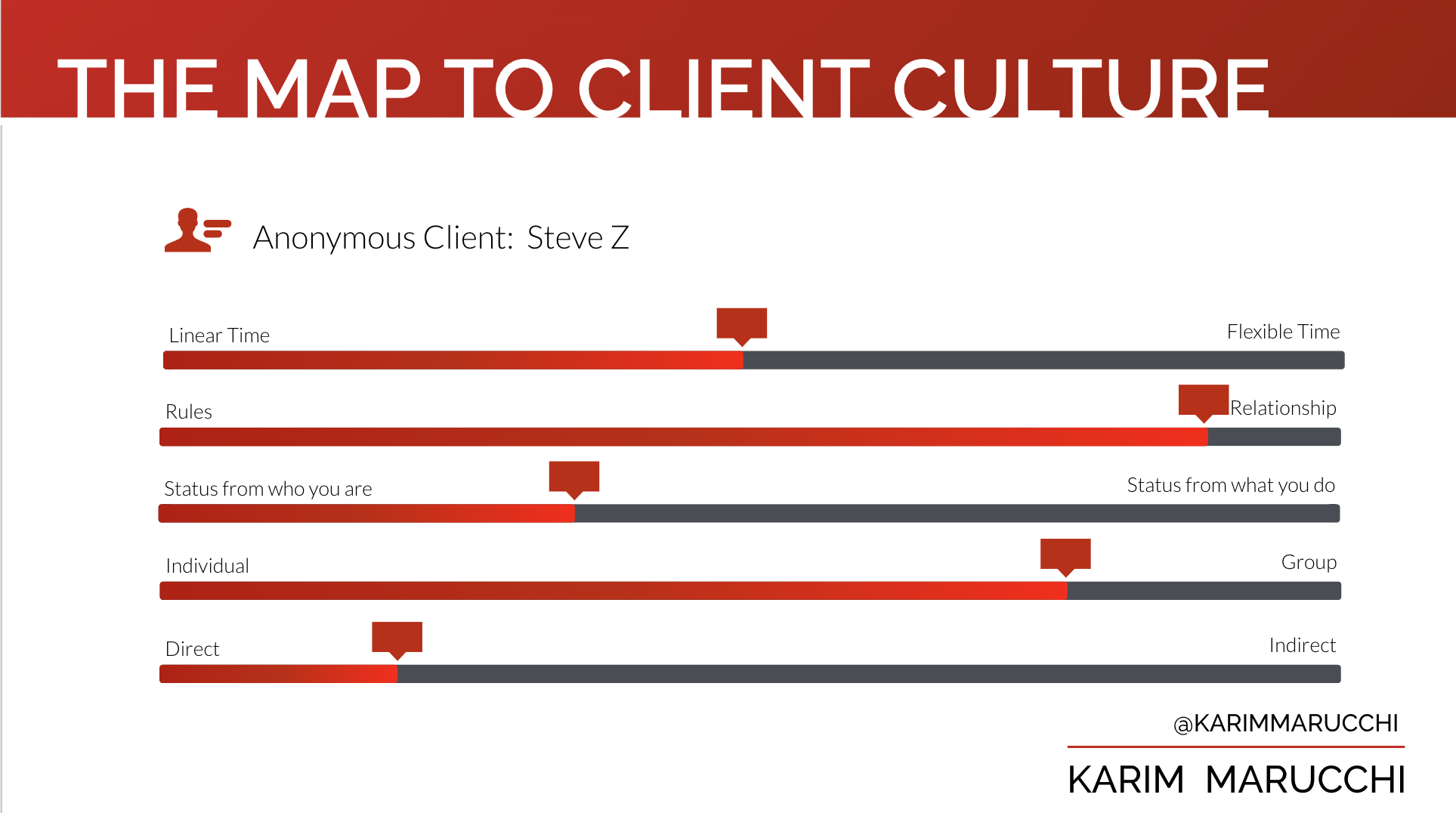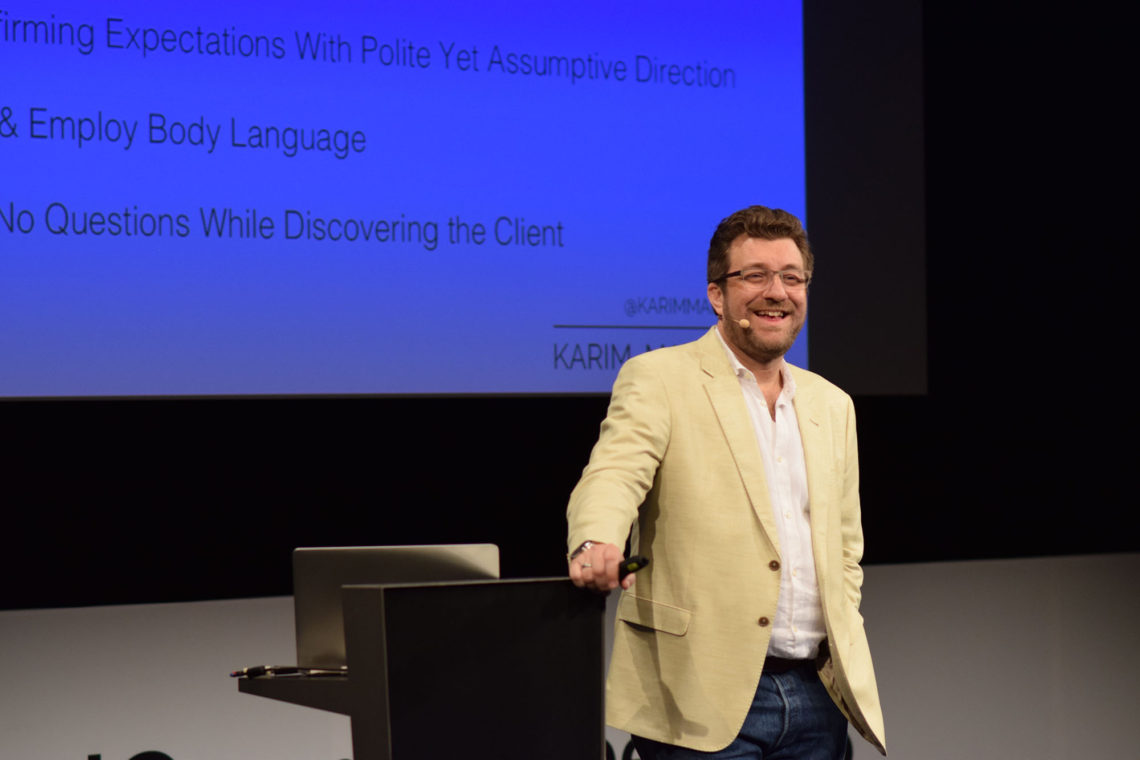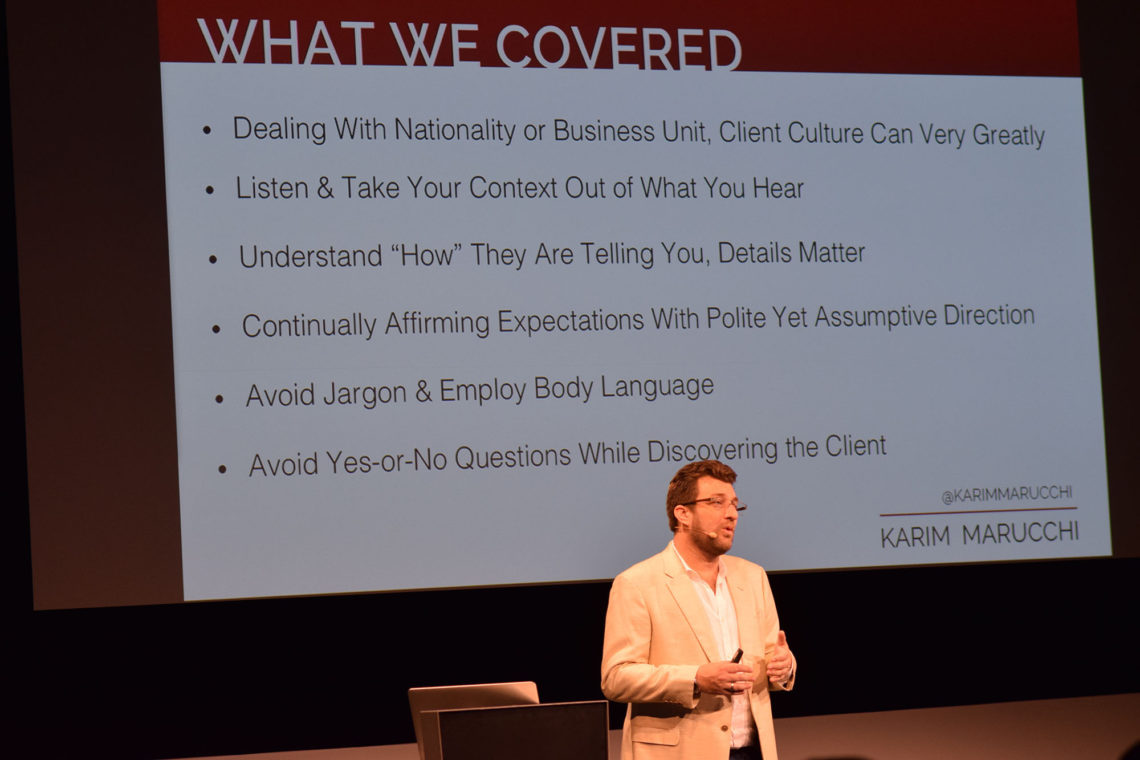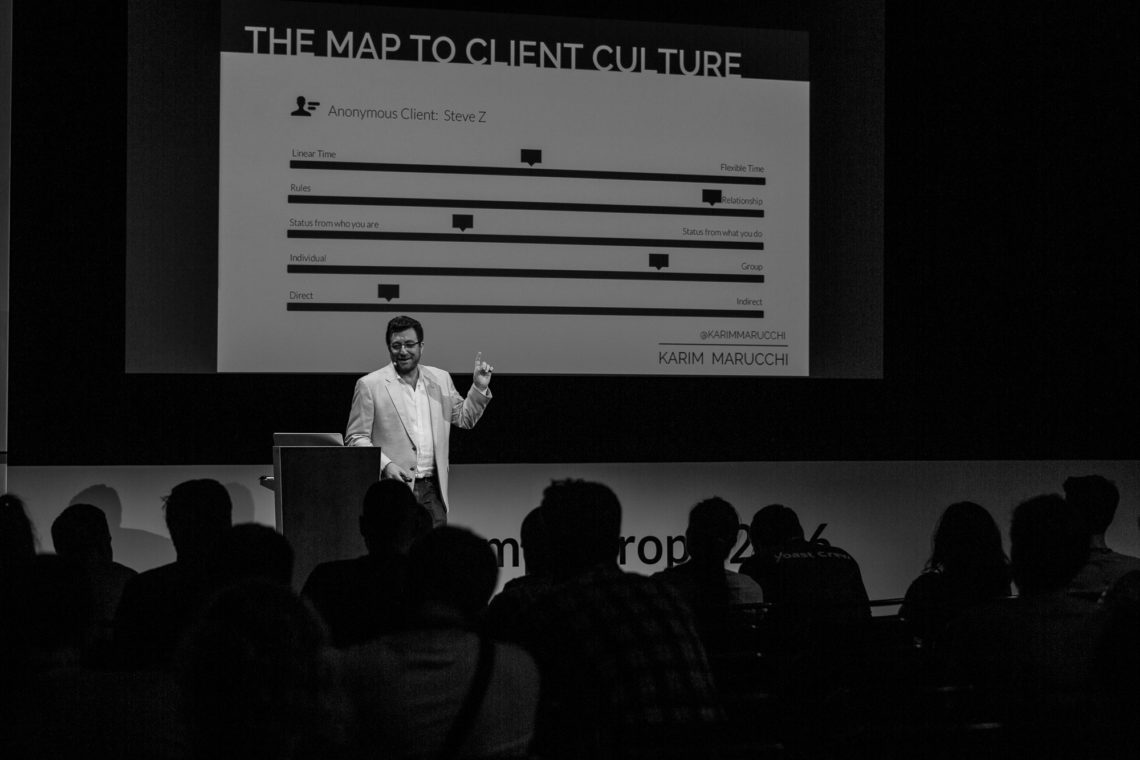When it comes to dealing with different client cultures, it is important to start with empathy and understanding. Take yourself outside of your own experiences and just swim in what your customers are saying. Mirror back to them what they're saying in your own words. Study their body language. Study what they're talking about. Frequently stop and explain your thought processes of how you understand them.
If it's a culture that you're not familiar with, whether you're talking about nationality or business. Check in. When they say something that you think is important, let them know you heard.

Let's take a look at the client side...
So how does this translate into business or clients? Let's take a look at client culture. Whether you're talking about nationality, or talking about IT versus marketing versus advertising, sales. There are five things that you can map out when talking to clients to help understand their culture.
- How does a client value the timelines? Are they more interested in hitting the deadline or being flexible.
- How does a client value format over context and relational aspects of how you communicate with them?
- Does a client value pedigree of past work over your current interaction?
- Are they more worried about themselves or a win for their community or their team?
- Are they somebody who is very straight to the point or are they somebody who looks at things from many different angles?
First of all, listen, it is the most important aspect when working with clients of any culture.
– Karim Marucchi
Takeaways from WordCamp Europe, Vienna
- Dealing with nationality or business units, client culture can vary greatly
- Listen and take your context out of what you hear
- Understand “How” they are telling you the information. Details matter
- Continually affirm expectations with polite yet assumptive direction
- Avoid jargon and employ body language
- Avoid yes or no questions while in discovery with the client
Slides From The Talk
Photos From The Talk
Video Transcription
| Karim | Thank you. Thank you very much. It is an absolute pleasure to be here. I'd like to thank the wonderful organizers, best WordCamp ever. It's incredible. It's so large that I can't seem to find all of my friends and the people I know in the community so if I haven't found you, please come and say hello. So today we're going to talk about working with different client cultures. This experience comes to me because I've had a wonderful opportunity of being born in Italy of an Italian family and on my mother's side, an American family. So in growing up, no matter where I went I was the kid from another culture. It was just dramatically different. I was always not the one associated with whoever was in the room. You learn to get used to being uncomfortable. You get comfortable with being uncomfortable. In doing that, you start to learn about the differences in culture. Today, I wanted to cover some of the tools and tips that in the last 22 years of dealing with client management, I've tried to use not only in dealing with specific nationality cultures but also business unit cultures. If you're dealing with a marketing department or an IT department, it can be very, very different. WordPress agencies today are faced with very different problems than the agencies even a few years ago. They need to negotiate the push and pull of different business units when they have different functions. If you're with a WordPress agency that specializes in marketing, those are your type of clients. But it doesn't mean that a technical client isn't going to come along and talk to you. So what we're going to try to do today is talk about some of those differences, nationality versus business unit and so forth. While I do have some quotes up here, there will be a slide at the end that covers all the major points. That's the one that you want to take a picture of if you're looking to take notes. Real simple for you. So what is culture? Very famous professor came up with the idea that the collective programming of the mind that distinguishes the members of one group category of people from others. Culture doesn't necessarily need to be nationality but it is the easiest way to start thinking about it. If you think about it from the point of view of a compliment. This is a very good quote from Charles the Fifth on what he found best about the different cultures in this general area. That's easy to compliment. For instance, in today's remote work culture, there's a lot made of breaking down the distances between borders. There's a lot made about the companies here who work internationally, work remotely, how easy it is. In the WP community, all I hear is how I can work from anywhere in the world. Soon, it's not going to matter where I am no matter what. What they're not taking into account when they have these positive conversations is the other side of the coin. For every time somebody will say something positive about a culture, they've got a stereotype in their mind about the negative parts of a culture. This is one of my favorite lines. It's also mentioned in one of my favorite TV shows and it uniquely insults almost all the same people. In today's Europe, we're being reminded about old and long divisions. But sometimes we forget to think about our work and highlight how incredible it is to work asynchronously around the world. We have email. We have Slack. We just quickly have to write a note to somebody and we can just work asynchronously. It doesn't matter where it is around the world. But culture matters. Culture is very important. Companies like Automatic. Companies like Human Made, Crowd Favorite. We spend an inordinate amount of time developing our culture to make up for the differences in nationality culture, in time zone culture, in upbringing, all the things. So in doing that, how do we study this? What do we look at because those are all inbound ways of looking at culture. All these companies are saying how do I deal with the culture inside my company? But if you're a client-facing company, you have clients that are from different cultures. So to start the journey, let's first take a look at nationality. Here's a very simple graphic that very quickly gives you an incredible idea of where some of these national cultures may land. Now you might be from one of these places. You might agree or disagree, but again, this comes from Harvard Business, not me. But very quickly, you can see some are confrontational, some avoid being confrontive. Some are very emotional. Some are very matter of fact. This can get complex. This can be a way of understanding it or it can make things more complicated for you. So let's just take an example. Let's look at the example for generating trust. Generating trust in different cultures along this line. You can say that there's cognitive trust. The trust where people actually make informed decisions based on data. And there's effective trust. With effective trust, people are making decisions based on emotion. Now you'll notice what I did way over here, right? If you've ever gone to Italy and actually tried to do business, you can sit in a meeting room and tell them all day long about your long list of accomplishments and you're going to get a nice polite head nod and they're going to shake your hand and maybe even offer you a coffee before you leave, and they go to the next person. If you really want to get that business in Italy, you go out to lunch with them. It doesn't matter who pays. You go out to lunch with them. You ask them about their family. You ask them about their vacation. You talk to them about anything except the possible project. I see the Italians are laughing so I know I'm right. How would you go about this in social interactions? First of all, listen. You are not sitting across from yourself. Pay attention at all times. Take yourself outside of your own experiences and just swim in what they're saying. Mirror back to them what they're saying in your own words. Study their body language. Study what they're talking about. Frequently stop and explain your thought processes of how you understand them if it's a culture that you're not familiar with, whether you're talking about nationality or business. Check in. When they say something that you think is important, don't be afraid to use body language to interrupt them to say I have something I'd like to share. So how does this translate into business or clients? Right? Because we've talked about nationality. Let's take a look at client culture. Here I have an anonymous client named Steve. Our friend, Steve, we need to map out what's important to him. There are five things that you can map out when talking to clients to help understand their culture. Whether you're talking about nationality, or talking about IT versus marketing versus advertising, sales. Number one, how does a client value the timelines? Are they more interested in hitting the deadline or being flexible. Number two, how does a client value format over context and relational aspects of how you communicate with them? Number three, does a client value pedigree of pass work over your current interaction? Number four, are they more worried about themselves or a win for their community or their team? Number five, are they somebody who's very straight to the point or are they somebody who looks at things from many different angles? Well, let's take a look. Our friend, Steve, well, he's been in this business for a long time so he hits deadlines. So that's linear time. Yet, being in this business he understands that sometimes things go wrong, so flexible. We'll put him right in the middle. Rules. Our friend, Steve, when talking to him you find out he doesn't have vendors, he has friends. So you're like okay, it's very important to this guy to be relational. So what's important to him? Where he came from or what he's doing? Well, in this case, what he's actually doing is very important to him. Is he somebody who's for the community, like the WordPress community, or is he just out to make a buck? In this case, definitely towards the community. And then, is he somebody who's very American who's like get to the point and tell me what you mean right now because let's go. Or is he more Italian and we're going to talk about everything but until the last five minutes of the conversation, right? So, that's what takes us to a couple of quick sort of tools you can use to map this out for yourself. As I said earlier, you want to listen. Don't bring your baggage to the conversation. Whether dealing with the client value or what their politics are, you'll have clients who value politics over schedule. You'll have other clients that value deep, long term experience in a subject rather than what's the newest, coolest thing we did with JavaScript. You have to gauge that. You have to try and understand that but leave your experiences at the door, your prejudices about that at the door, and just take a listen. Always keep in mind that they're not going to understand things the same way you do. I'll give you an example. A Texan, a Russian, and a New Yorker go into a restaurant in London. The waiter tells them, "Excuse me, if you're going to order the steak, I'm afraid there's a shortage due to the mad cow disease." The Texan says, "What's this shortage?" The Russian says, "What's afraid?" The New Yorker says, "What's excuse me?" All three of them heard something different in that sentence. I guarantee you, no matter how clear you think you're going to be about selling your service, about dealing with your client, they're not going to think you accented what you think you accented. So hit those points repeatedly. We all hear different things. Another thing that you'll hear whenever I'm speaking about project management and account management is always setting those expectations. In all my years of dealing with all sorts of professional services companies from business consulting through advertising agencies and digital agencies. All the horror stories aren't around a server crashing and burning. They're not around a technology that didn't work. They're around a misstated client expectation. A misunderstood specification. You can always understand better if you're continuously having that conversation. But how do you have that conversation? I have a telecommunications client whose company culture is email. And I don't mean two lines of email. You talk to them and you get 14 paragraphs. They will never pick up their phone. They will never want to have a meeting. They just want to use email. I have other clients in advertising and PR who send them an email, they're not even going to read it. I don't care if it's one sentence. They want to jump on that call. Even better than jumping on a call, have a video conference if they're not local. Why? We'll get into that in a second. This is key. This is something a lot of people who manage clients in agencies don't understand. Adapt to them. Adapt to how they are doing things but most of all, adapt to how you express disagreement. Some people, like our friend Steve, are much more direct. Other people, you will offend them if you tell them, you know what? That's a bad idea. You have to be careful. You have to understand them. It doesn't take that long. Within a few moments of having a discovery conversation, like David was speaking about earlier, you can actually map this out using these tools. If you're having trouble understanding a scope, avoid yes or no questions. That goes against everything you've ever been taught. It's like, state what you want to do and then just have them say yes or no. That's the number one cause of actually coming up to a disagreement because again, they're not going to hear exactly what you think you are emphasizing. So instead of stating a question that they can either answer yes or no, state an open ended question where they actually have to fill in the answer. With these rules, hopefully, you can deal with any type of client culture whether it's national, whether it's business unit oriented, whether it's internal or external, this will help you set better client expectations when working with different diverse cultures in your own country, around the world, in any way you can. Are there any questions about anything that we talked about? I'd love to get into it if anybody says you know what? I didn't understand X. Or I have a question about Y. Anybody? No? Okay. Well, so here's the entire list. I hope that it helped. I hope that it serves you well in trying to deal with cultures outside your own. Thank you very much and have a good rest of the WordCamp. |
About the Authors
Karim Marucchi Was Born in Rome and holds a Master of Architecture from La Sapienza University. Today as CEO of Crowd Favorite, a Digital Strategy and Engineering firm, he and his team work with Fortune 500 companies on planning and building tomorrow's Digital Transformations. His career has included founding multiple startups, working as an executive within the WPP Group in Europe, and has taken companies public. Karim has significant experience with mergers and acquisitions and figuring out how to make diverse teams work as a cohesive unit. Outside of Crowd Favorite, he has a passion for supporting leaders in the midst of significant business transitions, empowering the next generation of change makers, and extending environmental education around the world. This has led him to serve on various Boards of Directors, including the Captain Planet Foundation.





